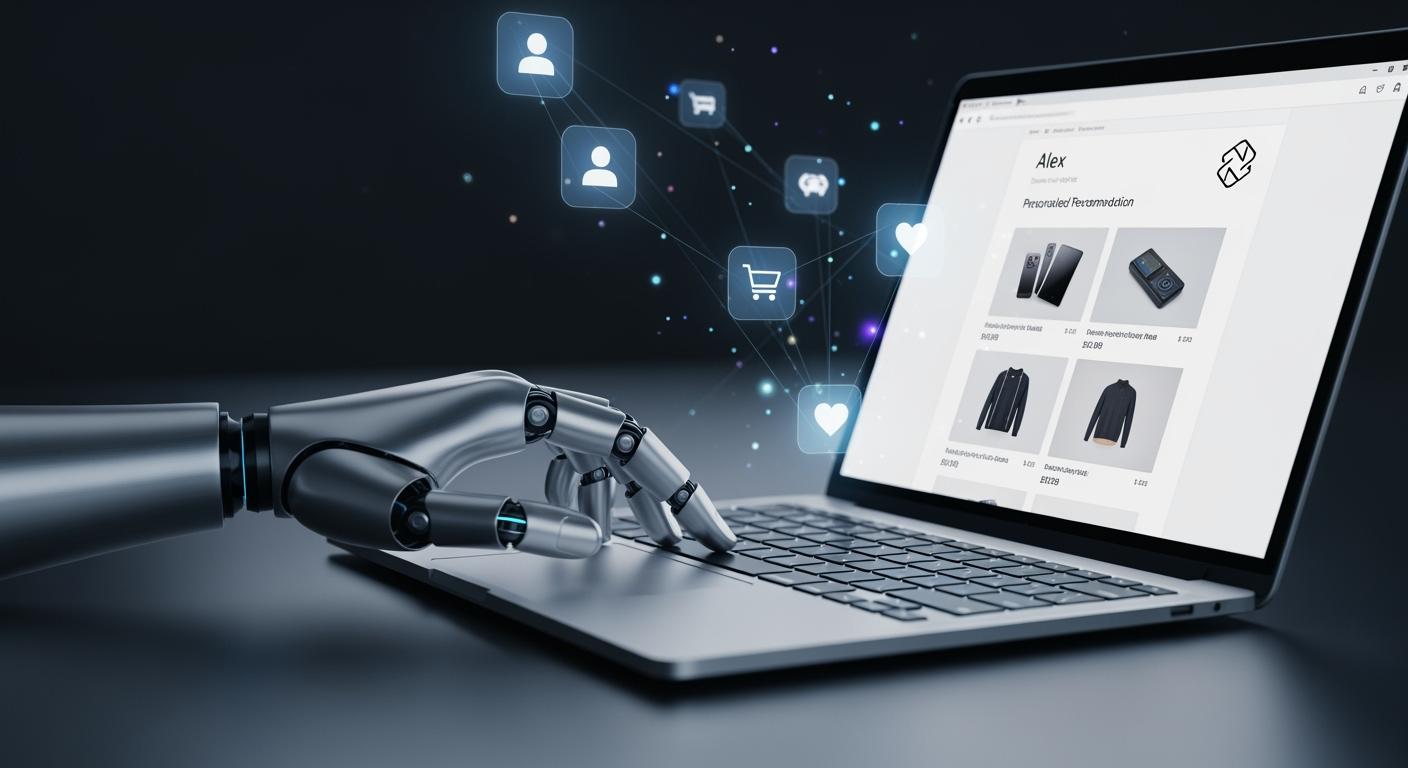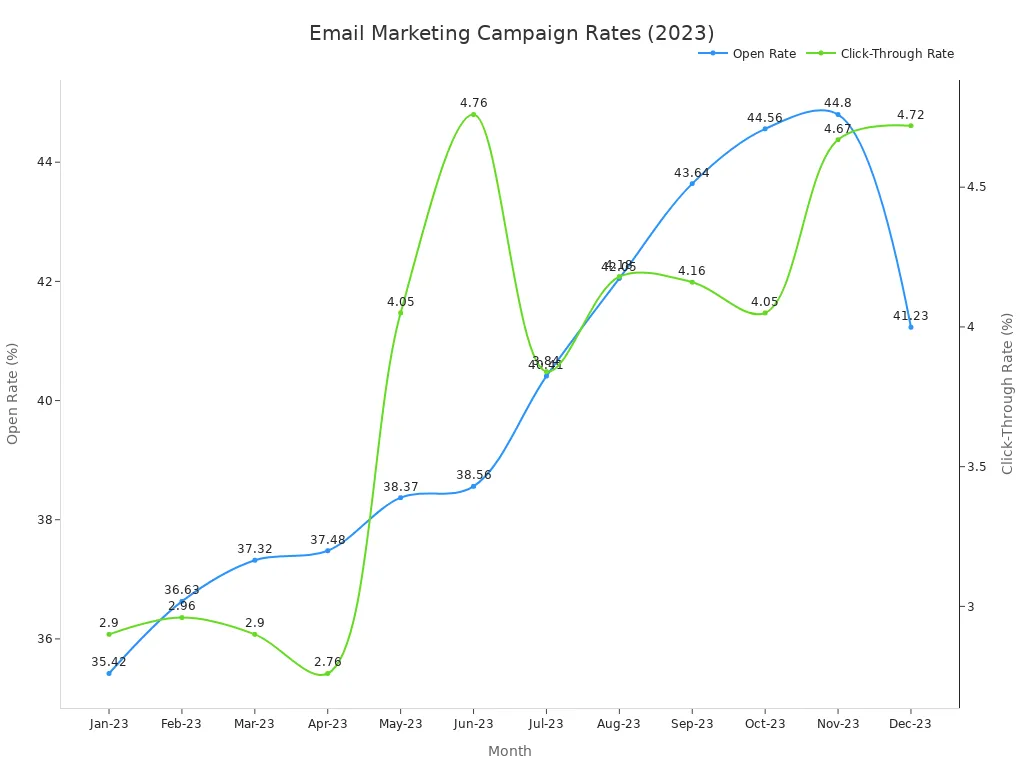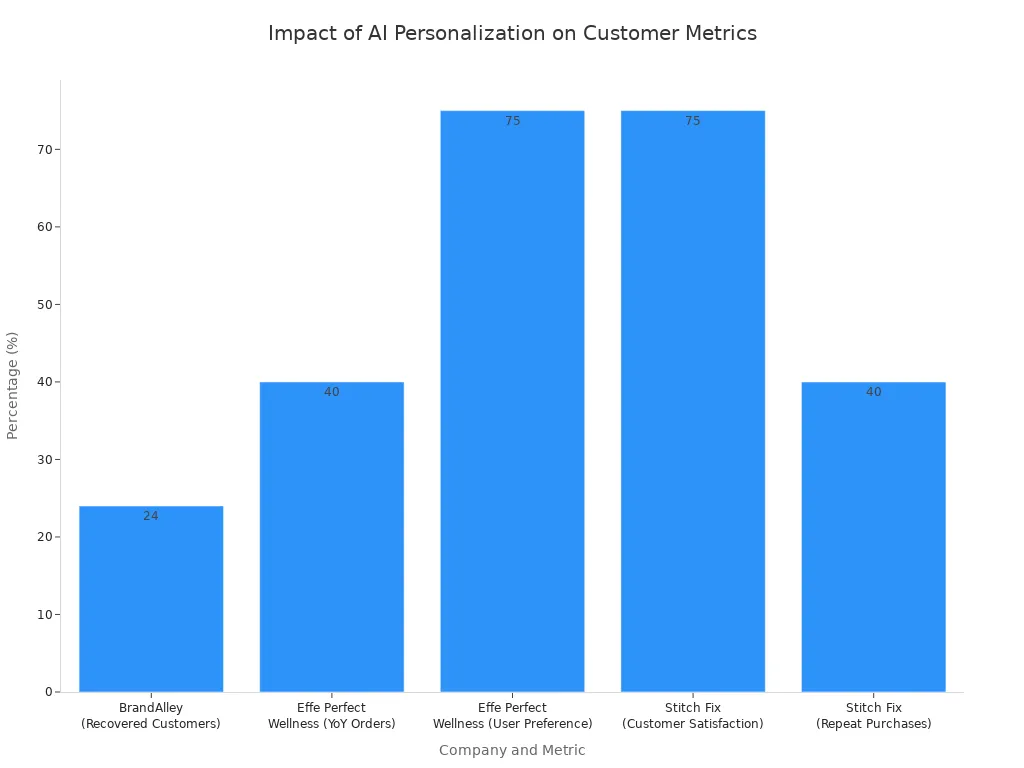
Does your email engagement feel stuck? Generic email campaigns often see low returns. You send messages to thousands, but few people click. This happens because the content is not personal to the customer.

Artificial intelligence (AI) offers a powerful solution. The right AI personalizes emails for each customer. AI analyzes customer data to create unique content. It delivers personalised product recommendations and special offers. This level of personalization boosts customer engagement. In fact, personalized emails can deliver six times higher transaction rates than non-personalized ones.
Understanding Personalized Email Marketing
Personalized email marketing moves beyond using just a customer's first name. True personalization means sending the right message to the right person at the right time. AI makes this possible by deeply understanding each customer. This approach builds stronger relationships and boosts customer retention.
Using Data for True Personalization
AI transforms raw customer data into powerful insights for your marketing. It analyzes a customer's purchase history, browsing behavior, and how they engage with your emails. The AI builds a detailed profile for each customer. This allows you to send emails that are perfectly tailored to individual preferences.
Your brand collects data from many sources. AI can process all of it.
- Transactional Data: This includes order history, purchase dates, and money spent.
- Behavioral Data: This covers website visits, search queries, and content preferences.
- Demographic Data: This involves age, gender, and location.
Using this information, AI personalizes emails with relevant content. It can create dynamic subject lines about a recent visit or send custom offers based on buying habits. This level of personalisation makes every email feel unique to the customer.
Predicting Customer Behavior with AI
AI can predict what your customers will do next. It uses machine learning models like logistic regression and random forests to analyze past actions. This helps you forecast future behavior. For example, AI can identify a customer who is likely to stop buying from you. You can then send a special offer to win them back.
Predictive analytics also helps you forecast which products a customer will likely buy.
The AI scores each customer on their chance to make a purchase. It processes every click and open to predict the best product or offer. This leads to highly relevant recommendations.
Amazon uses a similar AI method to suggest new products. The AI learns from a user's search history. If a customer often buys kitchen items, the AI will suggest new kitchen gadgets. This AI-driven personalisation makes product recommendations more effective.
Tailoring Content with Generative AI
Generative AI takes personalization a step further. It creates unique, hyper-personalized email content for each individual. This technology can write compelling subject lines and body copy. One brand found an AI-generated subject line led to more sales than a human-written one, even with a smaller discount. This shows the power of AI in crafting messages that connect with a customer.
Generative AI also customizes the look and feel of your marketing emails.
- Visuals: The AI can create or modify images to match the text and appeal to a customer's visual preferences.
- Tone: It can adjust the tone of voice to align with different customer segments while keeping your brand style consistent.
This technology allows you to create many versions of a campaign automatically. A cosmetics brand could use AI to send one customer an email about cruelty-free products. It could send another customer an email about new seasonal colors. This is how ai-powered email marketing delivers truly personalized content at scale. The AI ensures the right message and visuals reach the right person, making your marketing more impactful.
How AI Personalizes Emails with Key Tactics

Understanding the theory is one thing. Seeing how AI works in practice reveals its true power. You can use specific AI tactics to transform your email marketing from generic broadcasts into personal conversations. These strategies use customer data to deliver content that feels uniquely created for each person.
AI-Powered Recommendation Engines
Think of ai-powered recommendation engines as your brand's personal stylist for email campaigns. These systems analyze a customer's past purchases, browsing history, and items they add to a wishlist. The AI then predicts which other products the customer will love. This is a cornerstone of AI in e-commerce. Top brands like Amazon and Nike use this technology to drive significant revenue. Amazon attributes 35% of its sales to its powerful recommendations.
For fashion brands, this tactic creates a personalized style experience. The AI can suggest items that complete an outfit or match a customer's known style preferences. For example, the fashion retailer ASOS uses AI to send "Complete the Look" recommendations in its email campaigns. This single tactic led to a 24% increase in repeat purchases. You can use this strategy in several ways:
- Send post-purchase emails with products that complement a recent purchase.
- Include recommendations in abandoned cart emails to offer attractive alternatives.
- Showcase items similar to what a customer has viewed or bought before.
The benefit is clear and measurable. Brands that use AI for personalised product recommendations see a major boost in email engagement.
| Company/Platform | Click-Through Rate (CTR) Increase |
|---|---|
| Instacart | 25% |
| Salesforce Marketing Cloud | Up to 50% |
| ActiveCampaign | Up to 30% |
Automated Behavioral Triggers
Automated triggers send an email in response to a specific customer action. While cart abandonment emails are common, AI makes these triggers much smarter and more effective. The AI goes beyond simple "if-then" rules. It understands the context of a customer's behavior to send the perfect message.
You can set up triggers for many different actions.
- Post-Purchase Follow-ups: After a customer buys a fashion item, the AI can send a thank-you email that also suggests matching accessories.
- Content Consumption: If a customer reads several blog posts about sustainable fashion, the AI can trigger an email highlighting your eco-friendly product line.
- Browse Abandonment: When a customer views a specific dress but doesn't add it to their cart, you can send a follow-up email about that exact item a few hours later.
The real magic of AI is its ability to determine the perfect time to send these messages. The system learns when each individual customer is most likely to open an email. It builds a unique delivery profile for every person. This ensures your message arrives when engagement is most likely, dramatically improving open rates. This is how ai-powered email marketing recovers lost sales and deepens customer relationships.
Dynamic Content and Offers
Dynamic content takes personalization to the next level. This is where ai personalizes emails by changing the content inside the email itself. The images, headlines, and offers can update in real time, even after the email has been delivered. When a customer opens the message, the AI instantly populates it with the most relevant personalized content based on their latest browsing activity and preferences.
Imagine a customer opens your weekly fashion email campaigns. The hero image they see features a jacket they just viewed on your site. The product grid below is filled with items that match their style preferences. This is the power of dynamic content. The AI analyzes a shopper's behavior to determine their purchase intent.
- It tracks browsing activity and cart status.
- It identifies hesitant shoppers versus those ready to buy.
- It delivers personalized offers, like a small discount, to gently nudge a customer toward a purchase.
This level of personalisation makes every customer feel understood. The fashion brand Hearst UK used dynamic content to overhaul its email marketing. The results were incredible. They achieved a 100% increase in conversion rates for key campaigns and a 50% reduction in the time it took to build them. This shows how AI for fashion brands can drive both revenue and efficiency. Using a personal stylist for email campaigns approach with dynamic content ensures your marketing is always relevant and impactful, boosting email engagement and building lasting loyalty.
Implementing AI-Powered Email Marketing

Putting AI to work in your email marketing is more accessible than you might think. You can start with a clear, step-by-step approach. This process helps you choose the right tools and launch campaigns that deliver immediate results.
Choose the Right Platform
Your first step is to select an AI platform that fits your brand. Look for tools that integrate easily with your existing systems, like Shopify or Magento. Platforms such as Klaviyo, Omnisend, and ActiveCampaign are popular choices for this reason. A good AI tool should feel like a natural extension of your current marketing workflow.
When you evaluate platforms, look for these essential features:
- Predictive Analytics: The AI should forecast customer behavior.
- Content Generation: The tool should help you write email copy and subject lines.
- Send Time Optimization: The AI finds the perfect time to send each email.
- Robust Analytics: You need clear data to track your campaign performance.
The right AI platform gives you the power to build smarter marketing campaigns without needing a team of data scientists.
Start with a Core Campaign
You do not need to overhaul your entire email strategy at once. Instead, begin with one high-impact campaign to prove the value of AI. Campaigns with a high return on investment (ROI) are the best place to start.
A great first choice is an automated cart abandonment campaign. The AI can send a timely reminder with a personalized message. Another powerful option is a "We Miss You" campaign. The AI identifies inactive customers and sends personalized offers to win them back. Starting with focused campaigns shows you the power of AI quickly.
Test, Measure, and Optimize
AI-powered email marketing is not a "set it and forget it" strategy. You must continuously improve your campaigns. This is where testing and measuring become crucial. The AI makes this process simple through automated A/B testing. The AI can test different subject lines, images, or calls-to-action to see what resonates most with your audience.
You should track key metrics to measure success.
| Metric | What It Tells You |
|---|---|
| Open Rate | How many people opened your email. |
| Click-Through Rate | How many people clicked a link. |
| Conversion Rate | How many people made a purchase. |
The AI analyzes these results for you. It identifies patterns that a human might miss. This allows the AI to constantly refine your email campaigns for better engagement and more sales.
Integrating AI into your email strategy is an essential step. Many brands already use AI, with 87% of businesses that adopt AI applying it to their email campaigns. AI-driven personalisation builds stronger customer relationships and boosts customer retention. The right AI helps you understand each customer. This AI creates a significant competitive advantage. AI helps you connect with every customer.

This level of personalisation makes your brand stand out. The AI delivers better results for your campaigns.
Start with a single, focused campaign to see the impact of AI for yourself. Your customers will notice the difference.
FAQ
How much data do I need to start with AI?
You can start with basic data. Your customer purchase history and email engagement are great starting points. The AI platform learns and becomes smarter as you gather more information over time. This makes your future fashion campaigns more effective.
Can AI write all my emails for me?
AI can draft entire emails for you. However, you should always review the content. This step ensures the final message perfectly matches your brand's unique voice and style. Your oversight keeps the communication authentic.
Is AI expensive for a small fashion brand?
Many AI platforms offer scalable pricing. You can find plans that fit a small budget. Starting with one high-impact campaign proves AI's value. This approach lets your fashion business grow without a large upfront cost.
How does AI specifically help a fashion business?
AI acts like a personal stylist for your customers. It recommends the perfect fashion items based on their tastes. This use of ai for fashion brands makes your marketing highly relevant. It helps your fashion business sell more fashion products.
See Also
From Factory to Brand: Strategic Paths for Apparel Transformation
Revolutionary AI in Fashion: Crafting a Sustainable Future for Earth
Intelligent AI Solutions: Optimizing Fashion Returns for Business Efficiency
Unlocking Profit: AI-Driven Dynamic Pricing for Modern Retailers